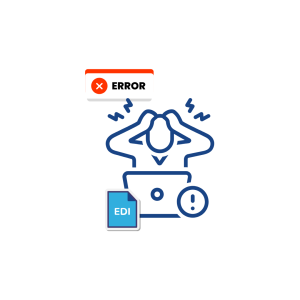Introduction
Electronic Data Interchange (EDI) has become an integral part of modern business operations, enabling efficient and secure data exchange between trading partners. When it comes to implementing EDI, businesses have two primary options: full service EDI providers and managed EDI service providers.
Let us compare these two approaches and explore their benefits and considerations. To provide a comprehensive overview, we will present a comparative table highlighting key features, capabilities, and considerations for each option.
Key Takeaways
- Full-Service EDI Providers handle all aspects of EDI, including setup, maintenance, and support, providing a complete, hands-off solution.
- Managed EDI Service Providers offer customizable support, allowing businesses to choose specific EDI tasks to outsource while keeping some control.
- Full-service EDI is ideal for companies seeking a comprehensive, end-to-end solution without in-house EDI management.
- Managed EDI services are more flexible, suiting companies that want control over certain EDI operations but need help with others.
- Choosing between the two depends on a business’s needs, budget, and desired level of involvement in EDI management.
Full Service EDI Providers vs Managed EDI Service Providers
Features Comparative Table
Compare |
Full Service EDI Providers |
Managed EDI Service Providers |
|---|---|---|
| Description | Comprehensive end-to-end EDI solutions | Outsourced management of EDI processes. |
| Implementation | Businesses manage the entire EDI infrastructure. | The service provider manages EDI infrastructure. |
| Expertise | In-house EDI expertise is required. | Reliance on the service provider’s EDI expertise. |
| Costs | Higher upfront investment and ongoing maintenance. | Lower upfront costs and predictable fees |
| Scalability | Scalability depends on in-house resources. | The service provider offers scalable solutions. |
| Flexibility | More control and customization options. | Less control, and limited customization options. |
| Maintenance | Internal responsibility for system maintenance. | The service provider manages system maintenance. |
| Compliance Management | Businesses are responsible for compliance adherence. | The service provider ensures compliance management. |
| Trading Partner | Direct communication and coordination with partners. | The service provider handles partner interactions. |
| Technical Support | Limited technical support from the provider. | Provider offers technical support and assistance. |
Full Service EDI Providers vs Managed EDI Service Providers
Considerations Comparative Table
Things to Consider | Full Service EDI Providers | Managed EDI Service Providers |
|---|---|---|
| Complexity and Control | Offers more control and customization options but requires in-house expertise to manage the infrastructure | Offer simplicity and convenience by outsourcing the management of EDI processes. |
| Costs | Typically involve higher upfront investment and ongoing maintenance costs.. | Offers lower upfront costs and predictable monthly fees.. |
| Scalability | Scalability with full-service providers depends on the organization’s internal resources | While managed service providers offer scalable solutions tailored to the business’s needs. |
| Technical Support | May offer limited technical support. | Typically provide comprehensive technical support and assistance |
Compliance and Adherence | Require businesses to ensure compliance adherence | Take on the responsibility of compliance management |
Conclusion
Choosing between a full service provider or a managed EDI service provider depends on various factors, including budget, in-house expertise, scalability requirements, and the level of control desired. Full service providers offer more control and customization options but require more internal management, while managed service providers provide convenience and expertise with lower upfront costs. Carefully evaluating the features, capabilities, and considerations discussed above will help businesses determine the most suitable option to meet their EDI requirements and drive successful electronic data interchange operations.
Commport EDI Solutions
Need Help? Download: EDI Buyers Guide
Unlock the full potential of your supply chain with our comprehensive EDI Buyer's Guide — your first step towards seamless, efficient, and error-free transactions
Frequently Asked Questions
Full-Service Providers: These providers offer end-to-end EDI solutions, including software, mapping, translation, and ongoing support. They handle all aspects of EDI implementation and management.
Managed EDI Service Providers: These providers focus on managing existing EDI systems rather than providing a complete solution. They offer services like monitoring, troubleshooting, and optimizing EDI processes.
Full-Service Providers: Ideal for small businesses lacking EDI expertise or resources. They offer comprehensive support, making EDI implementation and management hassle-free.
Managed EDI Service Providers: Suited for small businesses already equipped with EDI systems but needing assistance in maintenance and optimization. It’s a cost-effective solution for those not needing full-scale EDI implementation.
Full-Service Providers: Typically charge a setup fee along with ongoing subscription or transaction-based pricing. Costs cover comprehensive services, including software licenses, support, and updates.
Managed EDI Service Providers: Pricing models vary, often based on the level of support required. It can include monthly or annual subscriptions or pay-per-incident arrangements, making it adaptable to varying business needs.
Full-Service Providers: Switching may require more effort as it involves migrating entire EDI systems. However, comprehensive support from new providers can streamline the transition.
Managed EDI Service Providers: Switching is relatively easier since these providers focus on managing existing systems. Transitioning between providers involves mainly transferring service agreements and access credentials.
Business Complexity: Full-service providers are better for businesses with complex EDI needs, while managed providers suit those with existing systems needing maintenance.
Budget and Resources: Full-service providers may be costlier but offer comprehensive support, while managed providers offer more flexibility in pricing and resource allocation.
Scalability: Consider whether the chosen provider can accommodate future growth in transaction volume and complexity. Full-service providers often offer scalable solutions, while managed providers may require additional negotiation for scaling up.





